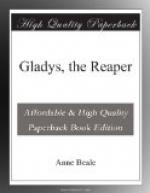Owen shook hands with Aunt ’Lizbeth, and introduced her to Madame Duvet and Mr Deep, after having asked them first of all whether they had seen her previously.
‘I never had that honour,’ said Madame Duvet, curtseying.
‘I didn’t be going to Abertewey since you was coming there, ma’am,’ said Mrs Griffey, rising and curtseying, to the unspeakable diversion of Mrs Rice Rice and Mr Deep.
The reader may remember that Mrs Jenkins was at Abertewey when Howel made his triumphant entry there, but the following morning he gave her to understand, as delicately as he could, that the idiomatic translations of the Welsh language which had been so refreshing in London, would be better in her native town than at Abertewey, and she departed accordingly.
His ire may be imagined, when he suddenly heard the well-known idioms lavished upon Madame Duvet and Mr Deep, who were enjoying them a great deal more than the concert, which, being principally in the vernacular, was not so intelligible and far less amusing. Mrs Jenkins was in her glory. Never had Mrs Rice Rice been so condescending before. She and Mr Deep made themselves more agreeable than she had supposed it possible for such grand people to be, and she frequently glanced at Owen, as much as to say, ‘And I am the person that your father turned out of doors!’
Owen, on his side, was sorry that he had exposed her to the sarcasm that she so little understood, and talked to Madame Duvet to withdraw attention from her.
As to Howel, his rising sun was obscured—his blushing honours were dimmed—his majesty, patronage, grandeur were lowered by the propinquity of his nearest of kin. In the midst of his county friends himself, he still felt that his mother was making herself ridiculous near at hand; whilst complimented and thanked for his patriotic support of native cos,[Footnote: Nightingales.] the native idioms rang in his ears, and he longed to annihilate them altogether. This on his right hand. On his left, Netta, looking literally like ‘a rose in June,’ and receiving the very marked attentions of Captain Dancy, on one side, and of Mr Rice Rice, junior, on the other. He scarcely knew which was most irritating, ‘the idioms,’ or her affected giggle. Trite but true is the proverb, ‘There is no rose without its thorn;’ and Howel was pricked severely by the thorns surrounding the rose of his first step into popularity.
Between the acts, and between the songs, Mrs Griffey went on something in this sort,—
’Indeet yes, sir! treue for you there. The Welsh is a splendit language. My son Howels—there he is to be proving it—do always say so. Ah! that’s “The rising of the lark,” I was singing that myself years ago. London! to be seure! Now there was singing I was hearing at the play. My son Howels did tak us to the play. I never was hearing or seeing the like in my life. Seure, the Queen Victoria or Prince




